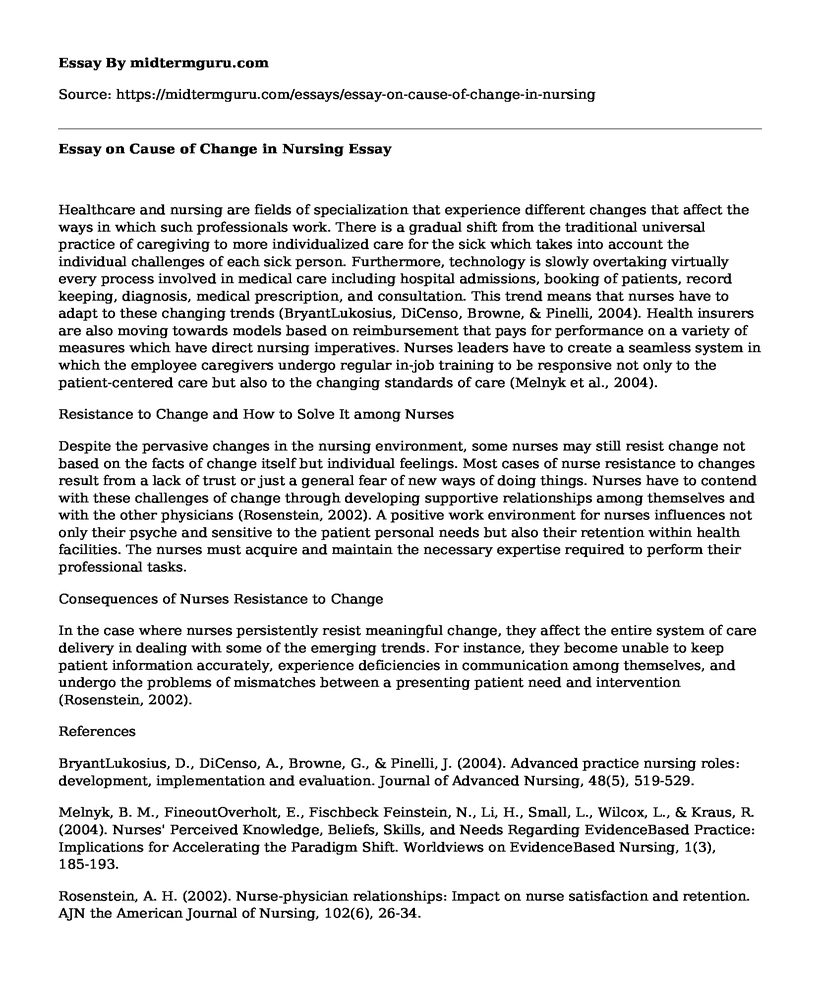Healthcare and nursing are fields of specialization that experience different changes that affect the ways in which such professionals work. There is a gradual shift from the traditional universal practice of caregiving to more individualized care for the sick which takes into account the individual challenges of each sick person. Furthermore, technology is slowly overtaking virtually every process involved in medical care including hospital admissions, booking of patients, record keeping, diagnosis, medical prescription, and consultation. This trend means that nurses have to adapt to these changing trends (BryantLukosius, DiCenso, Browne, & Pinelli, 2004). Health insurers are also moving towards models based on reimbursement that pays for performance on a variety of measures which have direct nursing imperatives. Nurses leaders have to create a seamless system in which the employee caregivers undergo regular in-job training to be responsive not only to the patient-centered care but also to the changing standards of care (Melnyk et al., 2004).
Resistance to Change and How to Solve It among Nurses
Despite the pervasive changes in the nursing environment, some nurses may still resist change not based on the facts of change itself but individual feelings. Most cases of nurse resistance to changes result from a lack of trust or just a general fear of new ways of doing things. Nurses have to contend with these challenges of change through developing supportive relationships among themselves and with the other physicians (Rosenstein, 2002). A positive work environment for nurses influences not only their psyche and sensitive to the patient personal needs but also their retention within health facilities. The nurses must acquire and maintain the necessary expertise required to perform their professional tasks.
Consequences of Nurses Resistance to Change
In the case where nurses persistently resist meaningful change, they affect the entire system of care delivery in dealing with some of the emerging trends. For instance, they become unable to keep patient information accurately, experience deficiencies in communication among themselves, and undergo the problems of mismatches between a presenting patient need and intervention (Rosenstein, 2002).
References
BryantLukosius, D., DiCenso, A., Browne, G., & Pinelli, J. (2004). Advanced practice nursing roles: development, implementation and evaluation. Journal of Advanced Nursing, 48(5), 519-529.
Melnyk, B. M., FineoutOverholt, E., Fischbeck Feinstein, N., Li, H., Small, L., Wilcox, L., & Kraus, R. (2004). Nurses' Perceived Knowledge, Beliefs, Skills, and Needs Regarding EvidenceBased Practice: Implications for Accelerating the Paradigm Shift. Worldviews on EvidenceBased Nursing, 1(3), 185-193.
Rosenstein, A. H. (2002). Nurse-physician relationships: Impact on nurse satisfaction and retention. AJN the American Journal of Nursing, 102(6), 26-34.
Cite this page
Essay on Cause of Change in Nursing. (2021, Jun 18). Retrieved from https://midtermguru.com/essays/essay-on-cause-of-change-in-nursing
If you are the original author of this essay and no longer wish to have it published on the midtermguru.com website, please click below to request its removal:
- Review of the Womens Health Initiative Article
- Reflection on the Health HEENT Assessment
- Paper Example on Peplau's Theory of Interpersonal Relations
- Paper Example on Nursing Professional Identity
- Essay Sample on Nursing Practice
- Patients at Risk: Inadequate Data Storage in Hospitals - Essay Sample
- Genetic & Environmental Factors in Autism Etiology - Essay Sample







